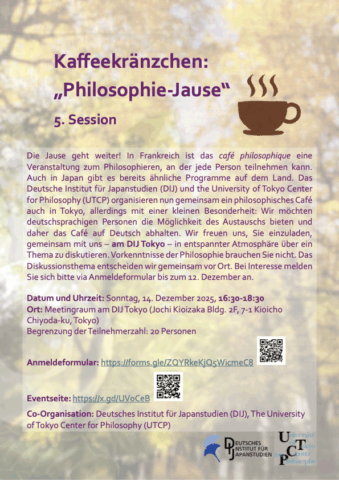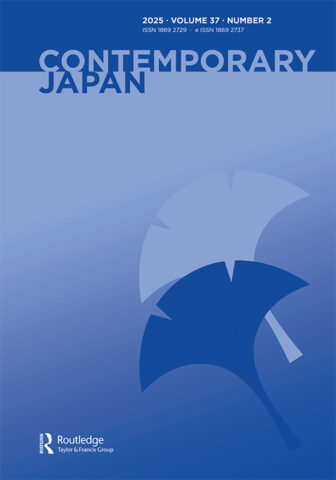Events and Activities
Hybrid DIJ Study Group on the Political Economy of U.S. Military Bases
 This talk provides an overview of the economic and political impacts of the presence of U.S. military bases in Japan. International relations research has traditionally examined U.S. bases qualitatively, treating them as an outcome of U.S. global security strategy. In contrast, military economics focus on the economic effects of base closures and realignments in the United States and Europe. Studies examining the impact of U.S. bases on Japan remain scarce. This research addresses this gap by presenting the historical and strategic background of U.S. bases in Japan, alongside empirical evidence and case studies that illustrate the effects of these bases on surrounding communities. The project employs a mixed-methods design and explores the relationship between U.S. bases and Japanese municipalities using the original dataset “The United States Bases in Japan”, which draws on a wide range of primary and secondary sources. Details and registration here
This talk provides an overview of the economic and political impacts of the presence of U.S. military bases in Japan. International relations research has traditionally examined U.S. bases qualitatively, treating them as an outcome of U.S. global security strategy. In contrast, military economics focus on the economic effects of base closures and realignments in the United States and Europe. Studies examining the impact of U.S. bases on Japan remain scarce. This research addresses this gap by presenting the historical and strategic background of U.S. bases in Japan, alongside empirical evidence and case studies that illustrate the effects of these bases on surrounding communities. The project employs a mixed-methods design and explores the relationship between U.S. bases and Japanese municipalities using the original dataset “The United States Bases in Japan”, which draws on a wide range of primary and secondary sources. Details and registration here
Hybrid DIJ Study Group on Industrial Policy and Technology Transfer in Postwar Japan

Was the postwar economic miracle a result of the Japanese government’s industrial policy, or did it occur despite it? Numerous studies on the effects of government policy on industrial growth have produced contradictory or inconclusive findings. In this talk, Krautter argues that one of the main instruments of industrial policy toward growth industries was the licensing system for technology imports. Focusing on technology policy, he finds that the licensing system positively influenced the terms and conditions of technology imports. Krautter contends that the government’s role in postwar industrial development was more that of a coordinator rather than of a “leader” or “guide.” This view is reflected in the description of the Japanese state as a coordination state, contrasting with the well-known concept of the developmental state. Details and registration here
Call for Applications: Mobility Fellowships – Global Indo-Pacific
 We invite applications for mobility fellowships in the research node “Global Indo-Pacific: Connecting Histories and Futures” for research stays at any partner institution from one to two months between April and October 2026. The node presently includes researchers from five MWS institutes (DIJ Tokyo, GHI London, MWF Delhi, GHI Paris, GHI Washington), the Asia Research Institute (ARI) at the National University of Singapore and the Institute for Asian and African Studies at the Humboldt-Universität zu Berlin. Centered at ARI, it conducts research within the three modules “History, Heritage and Civilization”, “Knowledge, Networks and Institutions”, and “Earth, Energy and Water”. The mobility fellowships support self-chosen innovative research projects with links to one of the node’s module themes. This call for applications aims at strengthening and expanding networks within and beyond the research node. Application deadline: December 14, 2025. Details here
We invite applications for mobility fellowships in the research node “Global Indo-Pacific: Connecting Histories and Futures” for research stays at any partner institution from one to two months between April and October 2026. The node presently includes researchers from five MWS institutes (DIJ Tokyo, GHI London, MWF Delhi, GHI Paris, GHI Washington), the Asia Research Institute (ARI) at the National University of Singapore and the Institute for Asian and African Studies at the Humboldt-Universität zu Berlin. Centered at ARI, it conducts research within the three modules “History, Heritage and Civilization”, “Knowledge, Networks and Institutions”, and “Earth, Energy and Water”. The mobility fellowships support self-chosen innovative research projects with links to one of the node’s module themes. This call for applications aims at strengthening and expanding networks within and beyond the research node. Application deadline: December 14, 2025. Details here
Deutschsprachiges Kaffeekränzchen „Philosophie-Jause“
 Die Jause geht weiter! In Frankreich ist das café philosophique eine Veranstaltung zum Philosophieren, an der jede Person teilnehmen kann. Auch in Japan gibt es bereits ähnliche Programme auf dem Land. The University of Tokyo Center for Philosophy (UTCP) und das Deutsche Institut für Japanstudien (DIJ) organisieren gemeinsam ein philosophisches Café auch in Tokyo, allerdings mit einer kleinen Besonderheit: Wir möchten deutschsprachigen Personen die Möglichkeit des Austauschs bieten und daher das Café auf Deutsch abhalten. Das Organisationsteam (Yukiko Kuwayama, UTCP und Sebastian Polak-Rottmann, DIJ) freut sich, Sie wieder ins DIJ Tokyo einzuladen, um gemeinsam in entspannter Atmosphäre über ein Thema zu diskutieren. Fachliche Vorkenntnisse benötigen Sie nicht. Bei Interesse melden Sie sich bitte bis zum 12. Dezember an. Weitere Informationen hier
Die Jause geht weiter! In Frankreich ist das café philosophique eine Veranstaltung zum Philosophieren, an der jede Person teilnehmen kann. Auch in Japan gibt es bereits ähnliche Programme auf dem Land. The University of Tokyo Center for Philosophy (UTCP) und das Deutsche Institut für Japanstudien (DIJ) organisieren gemeinsam ein philosophisches Café auch in Tokyo, allerdings mit einer kleinen Besonderheit: Wir möchten deutschsprachigen Personen die Möglichkeit des Austauschs bieten und daher das Café auf Deutsch abhalten. Das Organisationsteam (Yukiko Kuwayama, UTCP und Sebastian Polak-Rottmann, DIJ) freut sich, Sie wieder ins DIJ Tokyo einzuladen, um gemeinsam in entspannter Atmosphäre über ein Thema zu diskutieren. Fachliche Vorkenntnisse benötigen Sie nicht. Bei Interesse melden Sie sich bitte bis zum 12. Dezember an. Weitere Informationen hier
Hybrid DIJ Study Group on Rape in Contemporary Japanese Women’s Literature
Rape represents a recurring theme in Japanese women’s literature. Even the earliest works created by Japanese women tell of rape, though over time these stories have been usurped and reinterpreted as tales of seduction and eroticism. While this reflects an androcentric worldview that still shapes perceptions of rape, Japanese women writers have long offered criticism and counter-concepts. Since the 1980s, as the discussion about sexual violence against women began in Japan, women authors have used literature to challenge androcentric conceptualizations of rape by writing from a female rape survivor’s perspective, criticizing romanticized and eroticized depictions by male authors. They contribute to breaking the taboo surrounding rape in everyday life, offering insight into women’s experiences and survival. This presentation examines selected works by contemporary Japanese women writers since the 1980s, comparing depictions of rape, trauma, and societal responses to show changes in the perception of raped women. Details and registration here
Speaker: Marija Tomic, University of Vienna/DIJ Tokyo
Workshop on Impact of AI on Macroeconomy and Financial Stability

The growing mobilization of big data and the rise of artificial intelligence (AI) are profoundly transforming the financial sector and the global economy. Their impact is expected to intensify, reshaping both financial markets and macroeconomic dynamics. Japan, a pioneer in digital finance through innovations such as cryptocurrencies and their regulation, is emblematic of this evolution. Meanwhile, the dominance of the US and China in digital finance raises questions about the strategic positioning of Japan and Europe in the digital era. AI enables market participants to exploit new forms of data, offering opportunities to enhance market efficiency if information quality is preserved. Yet, this reliance on algorithms also introduces new risks, including correlated decision-making, potential algorithmic collusion, and significant environmental costs linked to data processing. This workshop brings together researchers, central bankers, industrial players, and financial practitioners to advance understanding of these transformations and develop informed policy recommendations. Details and registration here
DIJ Newsletter Autumn 2025

The autumn issue of our DIJ Newsletter features updates on our research, publications, and events as well as news from the Institute, our team, and our outreach activities. We hope you will enjoy exploring this new edition of the DIJ Newsletter. If you haven’t done so yet, you can subscribe to receive our Newsletters directly to your inbox. The full issues and subscription form are available here.
New issue of Contemporary Japan published

The new issue of Contemporary Japan includes six original research articles plus our book review section, covering topics ranging from religion and politics to education, women’s empowerment, elderly workers, and Takarazuka fans. The research articles include “faith talk” in Japanese political rhetoric (Ernils Larsson), the “afterlife” of prime ministers, particularly Satō Eisaku (Taro Tsuda), an ethnographic study of a Korean international school (Kunisuke Hirano), literacy movements and female empowerment among Buraku (Chiara Fusari), elderly reemployment (Kazue Haga), and a spatial analysis of Takarazuka fandom (Zuzanna Baraniak-Hirata). Our book review section includes a monograph on the history of the Japanese destroyer Yukikaze (reviewed by Samuel P. Porter) and a handbook on postwar Japan (reviewed by Florian Coulmas).





 Open Access
Open Access
